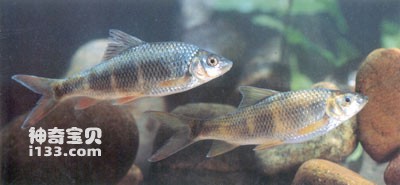Acrossocheillus iridescens belongs to the order Cypriniformes, family Cyprinidae, subfamily Acrossocheillus, and genus Acrossocheillus iridescens. Commonly known as: five-bar dace, fire-roasted dace, flowered olive fish, flowered fish, and sick-belly fish.
The body is long, the sides are flat, the caudal peduncle is thin, the back is arc-shaped in front of the dorsal fin, and the abdomen is round and straight. The head is pointed, and the head length is smaller than the body height; the snout is prominent, slightly shorter than or equal to the head length behind the eyes. The kiss skin droops slightly and ends at the base of the upper lip. It is not connected to the upper lip and its edge is intact. The mouth is small, lower, and horseshoe-shaped; the lips are fleshy, and the upper and lower lips are about the same width. The lower lip is divided into left and right flaps, which are quite wide apart, about 1/3 of the mouth width or more. The lower jaw is exposed and has horny edges. There are 2 pairs of barbels, the muzzle barbels are shorter than the chin barbels, and the chin barbels are approximately equal to the eye diameter or slightly shorter. The dorsal fin spines are thick and the trailing edge is strongly serrated; the caudal fin is large, deeply forked, and has a long pointed end. There are 5 orange-yellow horizontal bands on the side of the body. Pearl stars appear on the snout and the 4th and 5th branched fins of the anal fin of mature males; in males with a body length of more than 15 cm, the last unbranched ray of the dorsal fin and the first branched fin are extended in a filamentous shape. Length exceeds head length.

The rainbow ray is a fish in the middle and lower layers of rivers and lives in streams with gravel bottoms and clear water. Omnivorous, eating algae and aquatic plants as their main food. Individuals with a body length of about 10 cm reach sexual maturity, and the breeding season is from February to May every year; after June, the gonads degenerate and a large amount of fat accumulates in the body in preparation for winter.
The red phoenix is mainly distributed in the Pearl River water system, Yuanjiang water system and various rivers in Hainan Island. Medium-sized individuals, the common body length is 12-20 cm, and the larger ones can reach 30 cm. They are widely distributed and have considerable yields. They are a common economic fish in the production area. Fish eggs are poisonous. If eaten accidentally, they can cause poisoning, ranging from diarrhea to nausea, vomiting, dizziness, etc., and must be treated in time.
animal tags:
We created this article in conjunction with AI technology, then made sure it was fact-checked and edited by a Animals Top editor.